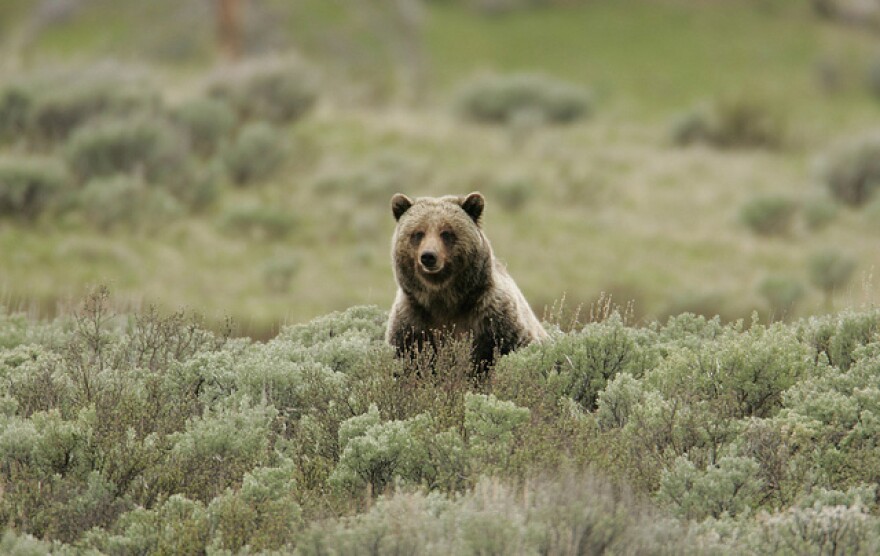Last week, the Northern Arapaho tribe issued a statement expressing frustration about being left out of a meeting on removing the grizzly bear from the Endangered Species List. The disagreement has left some people wondering if grizzly delisting could be the Dakota Access Pipeline of Wyoming in which local tribes assert themselves as sovereign nations.
Yufna Soldier Wolf is the director of the Northern Arapaho Tribal Historic Preservation Office, which might make you wonder, what's so historic about grizzly bears?
“The bear is sacred to us,” said Soldier Wolf. “You know, many animals are sacred to us.”
She said that connection to the species through long standing customs and oral histories now has an official term: Traditional Ecological Knowledge (TEK). Soldier Wolf said last year, the U.S. Fish and Wildlife Service adopted a policy requiring it to seek out such tribal knowledge before making big decisions like delisting culturally significant species.
“There should be something there saying that, well, hold on here. What do the tribes think? What are their views and tribal perspectives on the bear? We haven't even been asked that. You're the first one to ask me that,” said Soldier Wolf.
And, she says, the Interagency Grizzly Bear Committee even publicly announced the tribe supported the delisting.
“I’m actually not even being emailed or told when the meetings are happening,” she said.
Soldier Wolf says the same thing happened to the Standing Rock Sioux.
“I see it similar to what's happening at Standing Rock because of the tribes there—and we're one of the treaty tribes there—that aren't being taken seriously. They're thinking that, oh, we can override the tribes and what they have to say is not important.”
But, in fact, what the tribes have to say is important because by law they must be treated as self governing nations. That's according to Torivio Fodder, manager of the Indigenous Governance Program at the Native Nations Institute in Arizona. He says some of the earliest Supreme Court rulings gave tribes a special status. The legal term is sui generis, meaning “unlike anything else.”
Rather than sending a letter just stating their opposition to it, to actually connect with the Department of the Interior and say, hey, why weren't we included in this conversation? I think that's the key. That's sovereignty in action.
“They're unique entities in that their authority to govern predates the United States constitution,” said Fodder.
Fodder says, going forward, states will need to get used to reaching out to tribes, especially when it comes to energy development.
"There are massive coal reserves in Montana that sit on tribal lands. Even in Wyoming, there's the potential for significant geothermal energy on Wind River," he said. "So I mean, tribes are increasingly an important player in energy development. And I think that means it speaks for the need for consultation to avoid the issues we had at Standing Rock."
He says the energy industry adheres to strict permitting policies that require tribal consultation. But it falls on tribes to stay involved and, Fodder says, that's where the Standing Rock Sioux took a wrong turn.
“The tribes were approached about consultation and rather than engaging the process,” said Fodder, “they voiced their vociferous disagreement and sent a letter to the effect saying, we don't recognize the authority.”
Fodder said, by not engaging in the process, the Sioux weren't at the table when the decision to build a pipeline was made. He says, with grizzly delisting, the Northern Arapaho haven't made that mistake.
“Rather than sending a letter just stating their opposition to it, to actually connect with the Department of the Interior and say, hey, why weren't we included in this conversation? I think that's the key. That's sovereignty in action.”
The good news for tribes in Wyoming is that the state has been listening better than they have in the past. Leslie Shakespeare is the former Eastern Shoshone tribal liaison for Governor Matt Mead. He says, he felt welcome at that table, especially since the state took over hiring liaisons, instead of contracting the job with tribes. Shakespeare says he worked closely with the state to reintroduce wild bison on the reservation, and to negotiate a compromise when the state briefly legalized historical horse racing machines which competed with the tribes' casinos.
And he says, his tribe has stayed in the loop on energy development. He thinks the Standing Rock Sioux weren't so lucky.
“There's a difference between being consulted and your viewpoint not being taken into consideration when decisions are made,” said Shakespeare. “So I think particularly in our tribe's case, they're notified of every aspect of these different things that are happening.”
Senator Cale Case agrees. He's the chairman of the Tribal Relations Committee and says Wyoming has an unusually cooperative relationship with its tribes compared to other states.
“We are practically the only state that funds schools on the reservation, for example. That's extraordinary.”
And what's more, says Case, it's one of the only states to pay for tribal family services and water systems.
But he admits, his committee might have dropped the ball on grizzly delisting.
“I think if we would have done a better job in the tribal relations committee and actually saw that coming, we could have promoted meetings in advance of that and we missed that,” said Case.
But Preservation Director Yufna Soldier Wolf said the onus also falls on the tribes to assert themselves.
“There's a lot of laws that are made but [the government agencies] are the ones that are not following them. It's up to the tribes to shift that burden and make them and hold them accountable.”
Soldier Wolf says she's still waiting to hear back about how her tribe can get involved in the grizzly bear decision.








